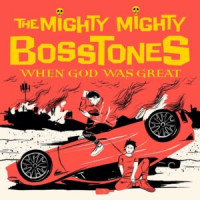The Mighty Mighty Bosstones unleashed a delightful showcase of their ska/punk expertise on their eleventh studio album, joining producer forces with longtime friend Ted Hutt and Rancid’s Tim Armstrong to bring us When God Was Great.
The record heart-strings with energy from guitarist Lawrence Katz and founding ’83 rhythm section: Nate Albert, Joe Gittleman, and Joe Sirois, chomping away in the pocket with the classic crispy Bosstones mix. Singer Dicky Barrett dives into verse one, sounding better than ever. The onslaught of tasty harmonies from the horn section as the chorus approaches, while textbook Mighty discography, breathes a new sense of urgency and pride that is wound around the entire piece.
There are themes of 2020 floating around the writing, a hook of ‘Gotta flatten the curve’ on “M O V E,” and ‘You tend to talk now, the fucking lock down’ on “I Don’t Believe in Anything,” offer some insight as to how the thirty-eight-year-old band chose to keep their hands busy over the last year. While the lyrical inspiration comes from a punch of negativity, the latter of the two songs gushes with a sense of acceptance that nothing is permanent, with a poignant pride sewn to its sleeve.
The content of “Certain Things” is perhaps some of the most honest confessions in the band’s collection, welcoming the pep and infectious horns of “Bruised.” “Lonely Boy,” “The Killing of Georgie (Part III),” and “You Had To Be There” orchestrate the outfit’s strongest parallels; ripping classic dancehall, then top notch 3rd wave, and finally four-to-the-floor two-tone ska. This is (of course) completed in a seamless and effortless way, and an excellent moment for the LP.
The title track of When God Was Good not only steers the album into piano ballad territory, but turns the page from the previously mentioned theme of “acceptance” orbiting side A. There is not only a finite sense to the tracklisting, but you can feel the warmth of a torch held by the band, as if in a world of uncertainty, the Bosstones grinded to complete a reflection of their legacy, just in case this was the last ride. “What It Takes” and “Long As I Can See the Light” follow similar piano direction and bittersweet ambivalence.
“The Truth Hurts,” “It Went Well,” and “I Don’t Want To Be You” slowly row the sound back into that of the more recent catalogue, with the horn section burning as bright as the aforementioned band torch, now prominently donned for album closer “The Final Parade.” The eight-minute marathon, dubbed “The Ska Summit” by Armstrong himself, hoists the Bosstones themselves into the arms of over thirty of the biggest names in ska/punk. With far too many to mention, the guest vocalists fill a roster as long as the band’s career, and while acknowledging the eldest ages of a few of said greats, the “love letter to ska music” displays candid evidence of a genre that isn’t going anywhere. Fantastic album.
